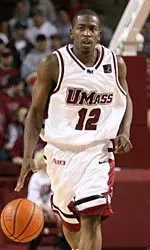University of Massachusets Athletics

Quiet Consistency: Anthony Anderson's Determination and Motivation
February 11, 2005 | Men's Basketball
Feb. 11, 2005
AMHERST, Mass. - Everybody who competes loves to win. Quite simply, being able to lead your team in victory is the greatest motivation of any player in any sport. This is senior guard Anthony Anderson's motivation. Internally, however, there is a deeper passion for a player who almost did not have the chance to play college basketball. Described by others as a leader by example, unselfish, and driven to win, Anderson pushes those around him to be better in hopes of returning UMass basketball back to national prominence.
In a game with over 330 schools competing to match the same goal, teams have to find a way to win. Some teams rely on a flashy go-to guy, while others rely on a stingy defense. Some teams make use of tremendous depth and others dominate the boards.
The Minutemen look to one of the smallest players on the roster whose quiet determination makes the team believe anything can be accomplished Senior year at Lynn English High School raised a lot of questions for Anderson. As Anderson admits, he was not even sure about going to college following his senior year. He did, however, consider many schools where he would have liked to play basketball including Florida State, St. John's and Villanova, but the list was short as many schools were not sure that he could get his SAT scores up. UMass, however, was interested in him as a person and a player and it would be here that Anderson knew he could flourish on the court and in the classroom.
While Anderson sat out his freshman year under NCAA academic guidelines, he worked hard enough in the classroom to graduate on time and earn back the year of eligibility that he deserved. Of course, he did not have to come back, but he says his decision to play this year was easy and not just because of the hard work he had put in to earn it.
"I knew we were going to be good this year and I had a lot of faith in Coach Lappas, the guys we had coming in and the guys who were coming back," Anderson said.
Sophomore Rashaun Freeman thinks coming back was good for Anderson since "he's been here some years when UMass has struggled and he's part of the reason why we're starting to make strides now."
Anderson also credits Lappas with teaching him that school is important and that basketball is not the only thing that he should be concentrating on. Anderson recalls a time when he was starting to slip in the classroom and Lappas sat him down and said, "I don't care if you're the rookie of the year or the player of the year. If you don't start going to class and getting your grades up, then you're not playing basketball anymore."
As every game passes, he continues to climb up in the school record books. But he insists that he actually doesn't even know about some of the records and that he often finds out about them when people call and congratulate him. Though he is not the stat-tracking type player, he maintains that he is proud of what he has accomplished individually.
Perhaps it is this simple fact that makes him such a great leader. While many leaders are very vocal or the team's highest scorer, Anderson leads best by example and by being vocal when he knows he needs to do just that. He acknowledges that it was hard for him to be a leader in the past since he was the young guy and the rest of the team was older than him. Now that he is the elder statesman of the team, he says it is much easier to feel comfortable as a leader and when he talks people listen.
Freeman was quick to echo this fact, saying that "when Anthony speaks up everybody tunes in because he's been here longer than anybody else."
It did not take long for Anthony's leadership abilities to have an impact on freshman Jeff "Big Deli" Salovski.
"Before practice and games, we huddle and he encourages us to play well and do our best out on the court. He's a just a great leader," said Salovski.
A career 11.5 point per game scorer, Anderson is not the flashy player that seems to be the dominant figure in college basketball today. An often quiet leader, he is a quiet, even stealth, presence on the court and he's happy with that role on this team.
"Ever since I've been here, all I've wanted to do was win. I don't care if I have two points. As long as I don't have a lot of turnovers, the statistics don't matter to me," Anderson says frankly.
But his role and impact on the team is not lost on his teammates.
"He plays as hard as he can every time out on the court - even in practice and in pickup games," states Salovski.
Jeff Viggiano goes a step further as he offers insight into Anderson's passion.
"He's an extremely emotional player. He just loves the game. All he cares about is winning. Whether it's at practice or over the summer in a pickup game, he'll get mad if the team loses."
There is no confusion, however, about what Anderson brings to the team. He's a leader. He has a passion for the game and he contributes in whatever way the team needs on a given night.
"There are no nights off. If you're not scoring, you have to be doing something else. Everybody has to be doing something," Anderon says. Viggiano acknowledges exactly how Anderson's own comments are reflected in his play.
"He doesn't need to score for us to win. When he does, it's an added bonus. He's a great defensive player and he locks up the other team's best player. He finds the open guy and never turns it over."
Anderson was fast to answer when asked about how Coach Lappas would describe him.
"He would say that I'm coachable, I understand the game, know what he's trying to do with the team and that I'm unselfish," he pauses and grins. "Sometimes to a fault. He always says that," Anderson laughs. Yet, as the saying would go, he saved the best, and most important to him, for last.
"He would say that all I want to do is win."
Maybe he is unselfish to a fault. He could average 20 points a game, but fans have all seen him pass up an open three to find a teammate cutting to the basket for a lay-up. He's a career 38.9% three point shooter and has connected on almost 42% this year, thus passing up an open three seems almost inconceivable as there is a very good chance he'll make it.
Maybe he is too unselfish. But when his pass leads to an easy two-point basket (he does after all have 100-plus assists in each of the last three seasons), we forget for the moment about the chance he passed up and cheer for the basket. Anderson takes the acknowledgement from the player he assisted and gets ready to defend because that is where the team needs his focus.
As important as winning is to Anderson, there is one greater motivation for the senior captain.
"I really want to be remembered as one of the guys that got UMass back into post-season play. I want to get UMass' name to be recognized nationally."
He adds in typical unselfish fashion that he wants "to make the program good for the kids that are going to come in next year and in the years after that."
At the mention of the words NCAA Tournament, Anderson's eyes light up and we have discovered the true root of his passion and motivation.
"Making the NCAA Tournament would make everything worth it. It would be a dream come true. I sit there every year and watch the tournament. They show the players on camera coming off the bus with their travel sweats and their headphones on and I just want to be one of those guys and have the nation watching us."
As for his post-college motivation, Anderson isn't sure what he wants to do after he leaves UMass. He has two three-year old boys at home and he is looking forward to being able to spend more time with them. As far as the game that he loves, he says he wants to see where it can take him.
"I might try to play overseas or maybe even do some NBA tryouts and see where that takes me."
However, he knows he would not want to be a coach in the future citing the stressful pressure of major college athletics as enough to keep him wary of the profession.
As for Coach Lappas, he knows exactly what Anderson brings to this team and he does not even have to pause to think about it.
"He's our leader. He knows everything that we do and gives a great effort everyday. He's always been unselfish - to a fault really. He wants to win and he wants to win badly. He doesn't really care what he does as long as we win. No doubt, that's always been his primary goal-- to win."
Sounds familiar.







